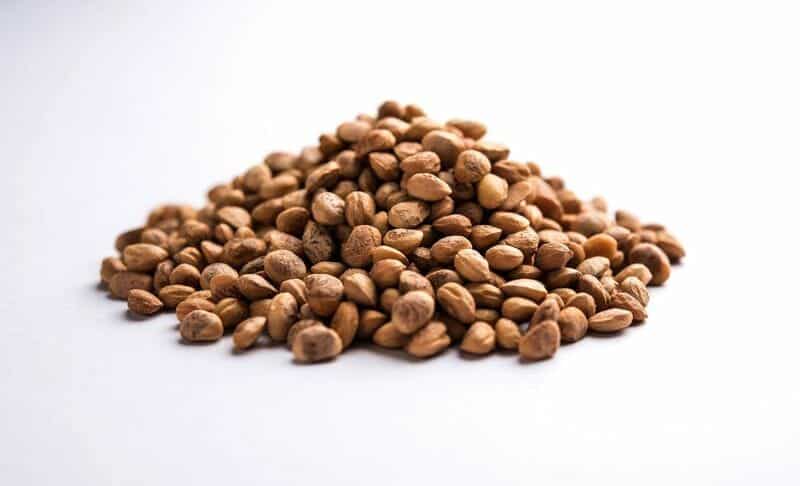
Ayurveda has long been a source of profound healing and nourishment. Among the countless treasures nature bestows upon us, charoli, known as “priyala” in Ayurveda, is a testament to plant-based remedies’ holistic power. Charoli are tiny, almond-flavored seeds derived from the evergreen Buchanania lanzan tree, indigenous to the Indian subcontinent.
While often overlooked in the modern world, these unassuming seeds possess remarkable therapeutic properties and health benefits. This article delves into the 15 benefits of charoli, shedding light on its place in the time-honored tradition of Ayurveda and its potential to enhance our well-being.
What is charoli?
Charoli, scientifically referred to as Buchanania lanzan Spreng., is a botanical gem from the Anacardiaceae family, renowned for its exceptional medicinal properties. In the ancient systems of medicine like Ayurveda and Unani, charoli is called “priyal” and is highly esteemed for its therapeutic applications.
Commercially, people also know these seeds as “chironji.” What makes charoli genuinely remarkable is its versatility, as all parts of the plant, from seeds to leaves, are harnessed for their healing potential in treating varied ailments. This multifaceted plant has become a valuable resource in traditional medicine systems, offering many health benefits. [1]
15 health benefits of consuming charoli
Consuming charoli offers the following health benefits rooted in its rich medicinal properties.
1. Antioxidant
Charoli has potent antioxidant properties, which help combat the body’s oxidative stress and reduce the risk of chronic diseases.
2. Adaptogenic
It exhibits adaptogenic qualities, aiding the body in coping with stress and maintaining overall balance.
3. Anti-inflammatory
Charoli possesses anti-inflammatory attributes, making it valuable in alleviating inflammation-related conditions.
4. Analgesic
Its analgesic properties make it an effective agent in relieving pain and discomfort.
5. Anti-diabetic
Charoli has been studied for its potential to regulate blood sugar levels. It is thus beneficial for individuals with diabetes.
6. Anti-hyperlipidemic
It aids in lowering elevated lipid levels in the blood, contributing to improved heart health.
7. Anti-diarrhoeal
Charoli can provide relief from diarrhea by exerting anti-diarrheal effects.
8. Antiulcer
It demonstrates antiulcer properties, offering support in the treatment of gastric ulcers.
9. Diuretic
Charoli’s diuretic effects promote increased urine production, aiding in eliminating toxins from the body.
10. Curative
It finds use as a curative agent for various ailments, showcasing its versatility in traditional medicine.
11. Neuro-psychopharmacological
Charoli exhibits neuro-psychopharmacological effects, potentially benefiting mental health and cognitive function.
12. Chemopreventive
Research suggests that Charoli may play a role in managing certain types of cancer.
13. Anticancer
Researchers are exploring charoli for its potential in cancer treatment due to its promising anticancer properties.
14. Wound healing
Charoli has been traditionally used for wound healing, promoting faster recovery and reduced scarring.
15. Antivenom
In some regions, people use charoli for its antivenom properties, aiding in treating snake bites and other venomous envenomations. [2]
How to consume charoli?
Consuming charoli involves various methods to harness its health benefits effectively. Here are some guidelines.
- Raw consumption
You can consume charoli seeds raw as a snack or add to salads and yogurt for a crunchy texture and a nutty, almond-like flavor. Ensure they are clean and free from impurities before consumption.
- Roasting
Lightly roast charoli seeds in a dry pan until they turn golden brown. Roasting enhances their flavor and can make them more palatable. You can eat roasted charoli as is or in various recipes.
- Cooking
Charoli is a versatile ingredient in Indian cuisine. People often use it in gravies, curries, and rice dishes, imparting a unique taste and texture. Add them during the cooking process to allow their flavors to infuse into the dish.
- Desserts
Charoli is a popular addition to Indian sweets and desserts. They are used in making traditional treats like kheer (rice pudding), barfi, and laddoos. These desserts are delicious and provide the health benefits of charoli.
- Chutneys and sauces
Charoli can be ground into a paste and used to prepare chutneys, sauces, or dips. This adds a delightful nutty flavor and thickens the consistency of the condiment.
- Baking
Incorporate charoli into baked goods like cookies and cakes for a crunch and nutty taste. Remember to chop or grind them as needed to suit the recipe.
- Mixed with spices
You can mix charoli seeds with various spices to create unique spice blends, enhancing the flavor profile of your dishes.
FAQs
1. What is charoli in English?
Charoli, in English, refers to the seeds of the Buchanania lanzan tree. These seeds are also known as chironji seeds.
2. What are charoli seeds?
Charoli seeds, also called chironji seeds, are the edible seeds of the Buchanania lanzan tree. These tiny, almond-flavored seeds are commonly used in Indian cuisine and have various culinary and medicinal applications.
3. What is charoli dry fruit?
Charoli dry fruit is the dried seeds of the Buchanania lanzan tree, commonly known as charoli or chironji seeds. These dried seeds find use in cooking, particularly in Indian sweets and desserts.
4. Does charoli produce fruit?
Charoli, or the Buchanania lanzan tree, does produce fruit. The fruit of this tree is small and green, with a hard shell that contains the prized charoli seeds.
5. What are the benefits of charoli?
Charoli offers many health benefits, including antioxidant activity, anti-inflammatory properties, potential anti-diabetic and anti-hyperlipidemic effects.
6. Are charoli nuts and charoli seeds the same thing?
Charoli nuts and charoli seeds are the same. These tiny, almond-flavored seeds are commonly called charoli nuts and charoli seeds.
7. Can I grow a Charoli plant at home?
Growing a charoli plant requires specific conditions. Charoli trees are native to India and thrive in tropical climates. You can grow them from seeds. However, it’s advisable to consult with a horticulturist or botanist for guidance on suitable conditions for cultivation and care.
Conclusion
The extensive benefits charoli offers underscore its significance in traditional and modern medicine. Its versatile applications, ranging from antioxidant and anti-inflammatory properties to potential anticancer effects, speak to its multifaceted nature as a natural remedy.
As we continue to explore the depths of our natural world for holistic solutions to health and wellness, Charoli stands as a testament to the timeless wisdom of traditional medicine systems like Ayurveda. However, it is essential to exercise prudence and seek professional guidance when integrating charoli into your dietary and therapeutic practices.
Disclaimer
The information provided here does not intend to replace professional advice or treatment.
References


















